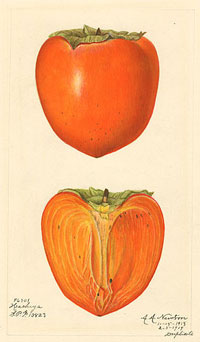
The Tyranny of the Fuyu Persimmon

Hachiya persimmon, in
When Commodore Matthew C. Perry sailed to Japan in 1854, he came bearing gifts. Among other things, Perry brought with him a barrel of whiskey, more than a few casks of wine, Audubon’s Birds of America, a quantity of cherry cordials, and four bundles of telegraph wires. In addition to “opening” Japan to foreign trade, Commodore Perry can boast also of bringing the hachiya persimmon to the United States. Americans were already familiar with the Virginian and Texan versions of the persimmon. In his 1624 General History of Virginia, Captain John Smith described his experience with the fruit: “If it not be ripe it will draw a man’s mouth awry with much torment. But when it is ripe, it is as delicious as an apricot.” Anyone who has eaten an unripe hachiya persimmon will understand what Captain Smith is referring to. My first persimmon wasn’t quite ripe, and the memory of that tormenting astringency has stayed with me ever since. In recent years, the hachiya has been overtaken by the non-astringent fuyu, with a lack of tannins that has made them the most popular variety of persimmon in the United States and Japan. I’m all for variety, but I fear that in our collective desire for immediate persimmon gratification we could lose a varietal whose exquisite taste also teaches a valuable lesson in patience.
And that is why I decided last week at the farmer’s market to eschew the fuyus, lined up hard and squat like an army of mutant tomatoes. I found one farmer selling the larger, acorn-shaped hachiyas (which used to account for the majority of persimmons consumed in the United States) and bought one. He told me it would take a week or two to ripen. I smiled and said that I was ready to wait. It’s been more than a week now and the persimmon is only a touch softer then when I brought it home. Bright orange and topped with a four pointed stem, it stares at me from the bottom of my fruit bowl, taunting me with its sloth. In the meantime, I admit, I have eaten a few fuyus. But every time I crunch into one I feel guilty, knowing that my choice is just another nail in the coffin of a bygone era. It’s a feeling not unlike the one I get when I read the New York Times online, when I ignore my local bookstore for a cheaper copy on Amazon or Alibris.
I have decided to take a stand. No more fuyu persimmons for me. This fall, I’m a hachiya man.
